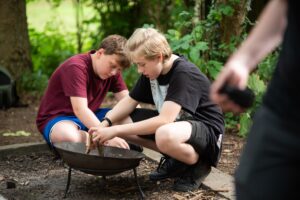In this month’s ‘meet the teacher’ guest blog, Nikki McCuaig, Inclusion Teaching Assistant at Kiwi Primary School in Bulford, Wiltshire tells us what it’s like to support military children in a school where 98% of the student population are from a forces family. She also tells us how Kiwi School use the Little Troopers Military Child Wellbeing Course regularly to help equip service children with the skills they need to manage challenge and change.
Tell us about yourself and how you came to be a teaching assistant?
I have been a teaching assistant at Kiwi Primary School for three years. I began my journey working with children 16 years ago when I started my NVQ Level 2. As a spouse of a soldier, I have travelled around the UK and been able to work in several schools and nurseries. My ever-evolving role now includes being a Thrive Practitioner in addition to leading the Little Troopers sessions which we regularly run for service children at our school.
How many military children are there in your school?
Kiwi Primary has a huge percentage of military families, (around 98%) mostly serving in the Army.
How does your school support forces’ families?
We run several groups which follow the Little Troopers Military Child Wellbeing Course as well as many other events throughout the year. Last Christmas, we delivered gifts and chocolates to all our families impacted by Covid-19, who had a parent deployed. We have had several visits over the years from the Royal Family. Recently we were visited by Sophie, Countess of Wessex, who had the opportunity to observe a Little Troopers session in action.
Do you have a connection to the military? If so do you think this helps you when interacting with the service pupils?
My husband is in the Army and has been for many years. As a family we have moved around several times, mostly around the UK. This has given me a sense of the impact that deployment and moving home can have on our service children. I am able to empathise and work with children through these difficult times.
What initiatives or projects have worked particularly well?
Little Troopers is a well-equipped, thoughtful resource which is used most days at Kiwi. The scheme includes various activities which the children can relate to allowing them to share their experiences in a fun way. It has been especially helpful to have staff from Little Troopers, come into school and deliver training, particularly for the EYFS role play activities.
Why do you think it’s important to offer targeted support for military children in school?
Deployment and moving home, can be a cause of much stress for all families. Children need support and consistency when dealing with these mixed emotions of excitement but also worry around military life.
In your experience, what are the biggest challenges faced by military children in school?
Transition and attachment are the key issues for families in the military. The fear of being separate from a parent for long periods of time can have a huge impact on some children. We all know that emotional turbulence can have a negative impact on a child’s ability to learn and focus when at school. Resources such as those from Little Troopers equip children with the skills to manage such specific challenges in their everyday lives.
Have these challenges changed during your time as a teaching assistant?
Absolutely, I have become more focussed on developing my skills to support children’s emotional resilience and ability to adapt and cope with change that military families face.
What’s the one thing you think is most important for schools to do for forces children?
Develop a whole school approach to helping and supporting children with their emotional needs.
What advice would you offer to other teachers and schools working with military children?
If teachers are unfamiliar with the military lifestyle I would urge them to take steps to understand the children’s unique circumstances. This would enable the development of a whole school approach and understanding of the impact on military children that deployment and moving home can have






